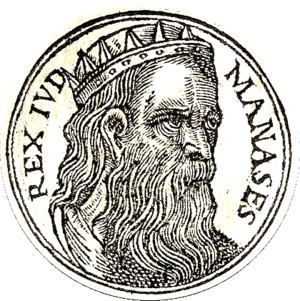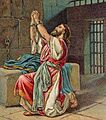Manasseh of Judah facts for kids
Quick facts for kids Manasseh |
|
|---|---|
 |
|
| King of Judah | |
| Reign | coregency 697–687 BC sole reign 687–643 BC |
| Predecessor | Hezekiah |
| Successor | Amon |
| Born | c. 709 BC probably Jerusalem |
| Died | c. 643 BC (aged 65 or 66) probably Jerusalem |
| Spouse | Meshullemeth |
| Issue | Amon |
| House | House of David |
| Father | Hezekiah |
| Mother | Hephzibah |
Manasseh was the fourteenth king of the ancient Kingdom of Judah. He was the son of Hezekiah and Hephzibah. Manasseh became king when he was just 12 years old. He ruled for a very long time, 55 years, which was the longest reign of any king in Judah's history.
Contents
Manasseh's Story in the Bible
The story of King Manasseh is found in the Hebrew Bible. You can read about him in the books of 2 Kings (chapter 21) and 2 Chronicles (chapter 33). He is also mentioned in the book of Jeremiah. The prophet Jeremiah spoke about the troubles that would come to Judah because of Manasseh's actions.
Manasseh was the first king of Judah after the northern kingdom of Israel was destroyed. This happened around 720 BC when the Assyrians conquered them.
Changes in Worship During Manasseh's Reign
Manasseh brought back many old religious practices that his father, King Hezekiah, had stopped. He allowed the worship of many gods, not just one. This is called polytheistic worship. He also brought back the worship of gods like Baal and Asherah. The Bible says he even encouraged the worship of Assyrian sky gods.
Manasseh married a woman named Meshullemeth. Her father was Haruz from Jotbah. Manasseh and Meshullemeth had a son named Amon. Amon later became king after Manasseh died. Manasseh, Hezekiah, and Amon are all mentioned in the family tree of Jesus in the Bible.
End of Manasseh's Long Reign
After ruling for 55 years, Manasseh died around 643 BC. He was buried in the garden of his own house, called the garden of Uzza. This was different from other kings who were usually buried in the City of David with their ancestors.
Some historians believe Manasseh started ruling with his father Hezekiah. This is called a "co-regency." It means they ruled together for about 12 years. Then Manasseh ruled alone until his death.
Manasseh and the Assyrian Empire
When Manasseh became king, Sennacherib was the king of Assyria. Assyria was a very powerful empire at that time. Manasseh is mentioned in Assyrian records. These records show that he was a loyal ruler who served the Assyrian kings.
Manasseh is listed among 22 kings who had to provide materials for building projects. These projects were for Esarhaddon, who was Sennacherib's son and the next Assyrian king. Later, Esarhaddon's son, Ashurbanipal, also mentioned Manasseh. He said Manasseh helped him with his military campaigns against Egypt.
Judah's Economy Under Manasseh
Archaeologists have found evidence that Judah was stable during Manasseh's time. Even though the Bible criticizes his religious choices, some archaeologists think Manasseh helped Judah's economy. They believe he helped the countryside's economy grow. Assyria might have given Judah special trading rights. This could have helped Judah sell its goods to other countries.
Some experts suggest that Manasseh's trade activities made Judah very wealthy. This might be why some Bible stories talk about King Solomon's great wealth from foreign trade.
Olive Oil Trade
Making and selling olive oil was a big part of the economy back then. There is evidence of a busy olive oil business in the area of Ekron. Forts were also built or rebuilt in places like Arad. These forts likely protected the important trade routes.
Some historians believe this trade led to big differences between rich and poor people. This might have caused problems and unrest among the people. They think this is why the Bible's book of 2 Kings describes Manasseh's focus on trade as turning away from God.
Manasseh's Religious Choices
The book of Kings describes three main problems with Manasseh's religious actions. First, he brought back old religious practices. Second, he openly adopted foreign ways of worship. Third, he treated the prophets very badly.
Manasseh reversed his father Hezekiah's changes. Hezekiah had tried to make worship focused only on God in the Temple. Manasseh brought back local shrines and allowed the worship of Baal and Asherah in the Temple. He also supported the Assyrian worship of stars and planets.
He was very dedicated to these foreign gods. The Bible says he even took part in a practice that involved children. This was part of the worship of a god called Moloch. The book of Kings also suggests that Manasseh may have punished people who supported his father's religious changes. During his long rule, the people's worship was a mix of local and foreign beliefs.
Prophets and Persecution
The Bible suggests that several prophets spoke out against Manasseh. These prophets likely included Isaiah and Habakkuk. Manasseh responded by persecuting those who criticized his religious choices. The prophets faced great danger. Some traditions say that Isaiah, who was Manasseh's own grandfather, was even executed under the king's orders. The Bible says that "innocent blood" filled the streets of Jerusalem.
Manasseh's Imprisonment and Change of Heart
The book of 2 Chronicles tells a different part of Manasseh's story. It says that Manasseh was captured and taken in chains to the Assyrian king. This might have been because the Assyrians thought he was not loyal. The Bible says he was later treated well and sent back to his throne.
According to 2 Chronicles, being imprisoned made Manasseh change his ways. He stopped worshiping idols and removed the foreign gods from Judah. He then told the people to worship only the Lord of Israel, Yahweh. However, the book of Kings and Assyrian records do not mention this event.
Manasseh in Other Writings
In some Jewish and Christian writings, Manasseh is accused of executing the prophet Isaiah. Isaiah is sometimes identified as Manasseh's maternal grandfather.
There is also a prayer called the Prayer of Manasseh. It is a prayer of sorrow and regret that is said to be from Manasseh. This prayer is found in some Christian Bibles. However, it is not considered part of the main Bible by Jews or most Protestants.
Manasseh is also mentioned in a book called 1 Meqabyan. This book is considered sacred in the Ethiopian Orthodox Tewahedo Church. In this book, Manasseh is used as an example of a king who did not follow God.
Images for kids
See also
- List of biblical figures identified in extra-biblical sources


